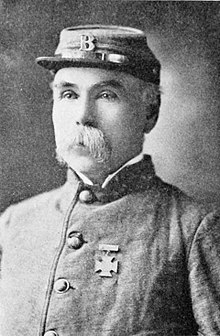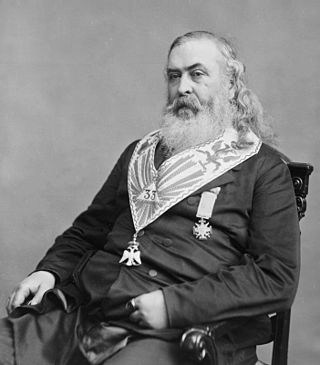
Albert Pike was an American author, poet, orator, editor, lawyer, jurist and Confederate States Army general who served as an associate justice of the Arkansas Supreme Court in exile from 1864 to 1865. He had previously served as a senior officer of the Confederate States Army, commanding the District of Indian Territory in the Trans-Mississippi Theater. A prominent member of the Freemasons, Pike served as the Sovereign Grand Commander of the Supreme Council, Scottish Rite from 1859 to 1891.

Nathan Bedford Forrest was a Confederate Army general during the American Civil War and was later the first Grand Wizard of the Ku Klux Klan from 1867 to 1869.

The United Daughters of the Confederacy (UDC) is an American neo-Confederate hereditary association for female descendants of Confederate Civil War soldiers engaging in the commemoration of these ancestors, the funding of monuments to them, and the promotion of the pseudohistorical Lost Cause ideology and corresponding white supremacy.

Mount Olivet Cemetery is a 206-acre (83 ha) cemetery located in Nashville, Tennessee. It is located approximately two miles East of downtown Nashville, and adjacent to the Catholic Calvary Cemetery. It is open to the public during daylight hours.
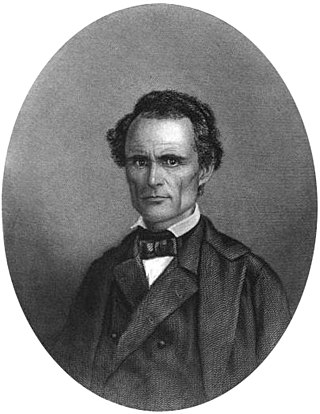
West Hughes Humphreys was the 3rd Attorney General of Tennessee and a United States district judge of the United States District Court for the Eastern District of Tennessee, the United States District Court for the Middle District of Tennessee, and the United States District Court for the Western District of Tennessee.
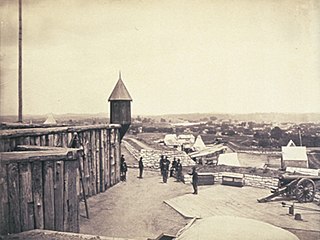
Fort Negley was a fortification built by Union troops after the capture of Nashville, Tennessee during the American Civil War, located approximately 2 miles (3.2 km) south of the city center. It was the largest inland fort built in the United States during the war.

George Washington Gordon was a general in the Confederate States Army during the American Civil War. After the war, he practiced law in Pulaski, Tennessee, where the Ku Klux Klan was formed. He became one of the Klan's first members. In 1867, Gordon became the Klan's first Grand Dragon for the Realm of Tennessee, and wrote its "Precept," a book describing its organization, purpose, and principles. He was also a member of the United States House of Representatives for the 10th congressional district of Tennessee.
This is a partial list of notable historical figures in U.S. national politics who were members of the Ku Klux Klan before taking office. Membership of the Klan is secret. Political opponents sometimes allege that a person was a member of the Klan, or was supported at the polls by Klan members.
Parry Wayne Humphreys was an American attorney, judge, and politician who represented Tennessee in the United States House of Representatives. After serving one term in the House, he later served eighteen years as a judge on the state judicial circuit. About 1836 Humphreys moved to Hernando, Mississippi, where he worked in banking for the remainder of his life.
James Geddes Stahlman was an American newspaper publisher and philanthropist. He was the publisher of the Nashville Banner. He was opposed to desegregation.
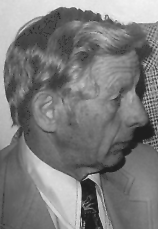
John Karl Kershaw was an American attorney best known for challenging the official account of the assassination of Martin Luther King, Jr. in 1968, claiming that his client James Earl Ray was an unwitting participant in a ploy devised by a mystery man named Raul to kill the civil rights leader.
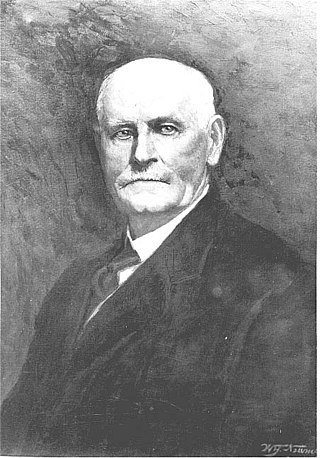
John Trotwood Moore (1858–1929) was an American journalist, writer and local historian. He was the author of many poems, short stories and novels. He served as the State Librarian and Archivist of Tennessee from 1919 to 1929. He created Moore Academy in Pine Apple, Alabama in 1883. He was "an apologist for the Old South", and a proponent of lynching.

The Home for Aged Masons, formerly known as the Masonic Widows' and Orphans' Home and the Middle Tennessee Tuberculosis Hospital, is a historic building in Nashville, Tennessee, USA.

John Watson Morton was an American Confederate military officer, farmer and politician. Educated at the Western Military Institute, he entered military service soon after graduation, with the outbreak of war. He served as captain of artillery under General Nathan Bedford Forrest in the Confederate States Army during the American Civil War. Afterward he was the founder of the Nashville chapter of the Ku Klux Klan during the Reconstruction era.

The Nathan Bedford Forrest Bust is a bust of Confederate States of America Lt. General and first-era Ku Klux Klan Grand Wizard Nathan Bedford Forrest that was prominently displayed in the Tennessee State Capitol in Nashville. On July 23, 2021, the bust was removed, and was relocated to the Tennessee State Museum in a new exhibit that opened four days later.
Edith D. Pope was an American editor. She was the second editor of the Confederate Veteran from 1914 to 1932, and the president of the Nashville No. 1 chapter of the United Daughters of the Confederacy from 1927 to 1930. She played a critical role in the promotion of the Lost Cause of the Confederacy.

Edward Bushrod Stahlman was an American railroad executive, newspaper publisher and real estate investor. He was the vice president of the Louisville and Nashville Railroad and the Louisville, New Albany and Chicago Railroad. He built The Stahlman, a skyscraper in Nashville, Tennessee, and he was the publisher of the Nashville Banner for 44 years.
Richard Alexander Sneed was an American Confederate veteran, Klansman and politician. After serving in the Confederate States Army during the American Civil War of 1861-1865, he was a co-founder of the Ku Klux Klan chapter in Madison County, Tennessee. A Democrat, he served as the Oklahoma Secretary of State from 1923 to 1927, the Oklahoma State Treasurer from 1927 to 1931, and the Oklahoma Secretary of State again from 1931 to 1935.
R. R. Sneed was an American politician. He served as the Tennessee Secretary of State from 1913 to 1917.

Lamar Fontaine was an American military officer, spy, surveyor, poet and author. He served in the Mexican–American War and the American Civil War, and he was a member of the Ku Klux Klan. He drew maps of Palestine, Japan and China. He authored poetry and a memoir.
